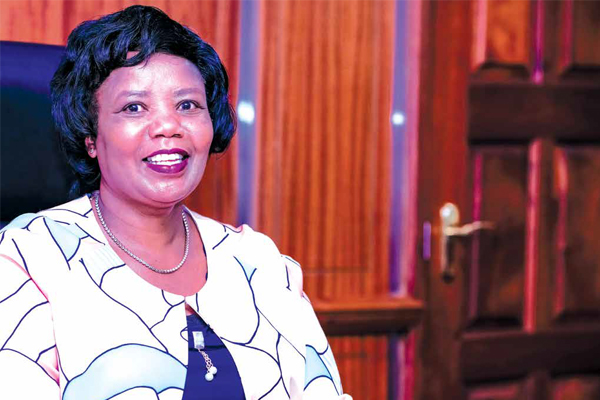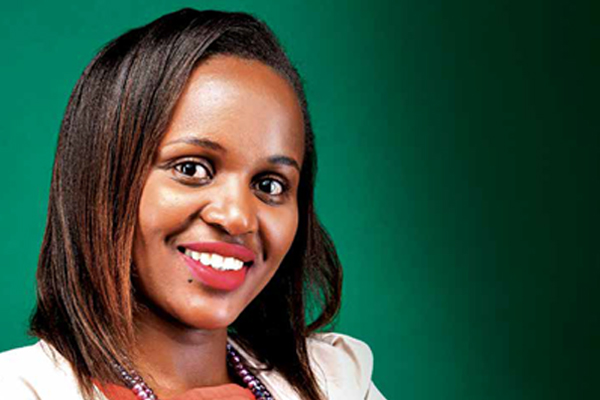#11
FAMILY BANK
INVESTING IN BUSINESSES TO SUPPORT THE COMMUNITY DURING THE PANDEMIC
To confirm its place among the banks that are rapidly growing and transforming lives of both businesses and citizens, inspite of the adverse effects unleashed on the economy by the effects of the COVID-19 Pandemic, the Family Bank closed the 2019-2020 riding a wave. The Bank posted a 63.6 per cent increase in its profit before tax through the first six months of 2020 to Sh 852.1 million, up from Sh 520.9 million registered in a similar period of 2019. This growth is attributed to an increase in net interest income hugely from loans and advances and income from government securities.
In the same period under review, the total operating income grew by 17.6 per cent to Sh 4.2 billion compared to Sh 3.6 billion the previus year. Non-funded income slightly decreased by 1.4 per cent to Sh 1.3 billion.
Under a new CEO, Rebecca Mbithi, the Family Bank has seen an expansion of its balance sheet in the same period as its loan book grew by 17.5 per cent to Sh 54.9 billion while customer deposits increased by 23.5 per cent to Sh 66.7 billion. Net interest income in the period rose by 28.5 per cent to Sh 2.9 billion from Sh 2.3 billion the previus year.

As the most rapidly growing bank, Family Bank’s Total assets grew by 19.7 per cent to Sh 86.9 billion compared to Sh 72.7 billion during the same period the previus year. Total operating expenses marginally rose by 9.8 per cent to Sh 3.4 billion, highlighting the cost containment measures being implemented by the Bank.
“The Bank’s impressive performance is a testament of the resilience of our business in light of our current tough operating environment amidst the COVID-19 Pandemic. Going forward, for our business outlook, we remain focused on driving a differentiated customer experience driven by a deeper understanding of our customers, automation and digitization of our processes, of which 80% of our transactions are on the digital platform anchored on simplicity and personalized service as we continue to cushion businesses, especially the MSMEs, through the emerging pressures,” adds MD and CEO, Rebecca Mbithi.
During the COVID-19 Pandemic, Family Bank offered relief and extension of loans to customers at no extra cost in order to cushion them from the adverse effects that has resulted in a downturn in both economic and social activities. In this area alone, Family Bank has restructured loans worth Sh 15Billion and provisioned Sh.464M for bad debt due to COVID-19 during the first half of the year. It has also waived all charges for account balance inquiries and money transfers between account and mobile money wallets, in collaboration with the Central Bank of Kenya.
“We recognize that the COVID-19 Pandemic has resulted in difficult operating environments. As a result, as part of our strategy to build a sustainable business, Family Bank also continues to work with the County Governments to assist vulnerable groups affected by the COVID-19 Pandemic. So far, we have contributed in-kind support in the form of ICU beds, ventilators, personal protective equipment like face masks, and foodbaskets, among others,” adds the Family Bank CEO.
Rebecca was appointed in mid-2018 and immediately shook the banking industry with her sterling performance. For instance, hardly a year into the job, Family Bank registered an historic and mind-boggling growth in profitability of 300% in the first three quarters of 2019, reflecting a huge jump from similar period in 2018.
The bank’s notable growth in the period is attributed to aggressive deposit taking and on-lending to micro, small and medium enterprises (MSMEs) that was against the weighted risk of a rate cap environment. Customer deposits grew by a substantive 26 percent to Ksh.60.2 billion as net loans and advances kept pace at 11 percent to grow to Ksh.49.3 billion.

“Our aggression in deposit taking was targeted at institutions, county governments, NGO’s, corporate and MSME customers as we arrived at an optimum deposit mix,” Rebecca Mbithi says in a corporate newsletter available on the bank’s website. In the same report, ‘Family Bank’s net interest income rose by 16.1 percent to Ksh.3.6 billion anchored on a flat Ksh.1.2 billion interest expense to depositing customers and a fall in other interest expenses.
Investments in digital continued to strengthen the bank’s balance sheet by weeding off costs to see operating expenses retained at a flat Ksh.4.7 billion from a similar period in 2018,’ the report adds. The CEO further states that, ‘Adoption of digital channels saw 70 per cent of transactions conducted online including requesting for loan advances. The enhanced efficiency has seen the lender improve on its asset quality in the slashing of its net non-performing loans portfolio by 15.5 percent to Ksh.4.6 billion.’
Going into 2022 as a rapidly growing and modernising bank, Family Bank’s most important tool is the Bank’s 2020-2024 Strategic Plan, dubbed ‘take-off’ that is aligned to 13 of the 17 United Nations Sustainable Development Goals (SDG). The bank will be scanning this strategic plan and aligning the same, to ensure that Family Bank provides loans and avails credit lines to meet the country’s focus on the Big 4 Agenda, as it has in the last three years, in order to continue.
Not any time in the recent past has the business community and the populace at large needed support than during the COVID-19 Pandemic. From the time the first COVID-19 case was reported in Kenya in March 2020, ‘normal life’ was altered. As part of the globe, we have become accustormed to the new normal. Businesses open and close, with normal hours interupted, schools open and shut, religious places are redefined as lockdowns and curfews have taken centerstage.

The government, working hand in hand with the banking community, had to take targeted measures to not only support businesses but also cushion families during the difficult period. Family Bank was at the forefront and went the extra mile to support businesses, county governments and the health sector in ensuring continuity despite the hardships brought about by the pandemic and its negative impact on the economy.
Going a step further in creating business opportinities during the tough period, Family Bank signed partnerships with several organisations that saw businesses receive asset financing at competitive rates. The partnership included with Simba Corporation, enabling SME customers in the trade, logistics and agribusiness receive 100 per cent financing to purchase Fuso trucks, Mitsubishi and Mahindra vehicles to enable them grow their business. The one signed with Toyota Kenya offers business entreprises 95% financing for Toyota Hilux pick-ups, Hino trucks and other double cab pick ups with the loan payable in 60 months. The Isuzu East Africa partnership grants the customers a 90-day repayment holiday on commercial vehicles purchases.
The support for businesses extended to other sectors including in education where Family Bank signed a partnership with Kenya Private School Association (KPSA) that offered a stimulus package to support learning institutions when the government began phased re-opening of schools.
Players in the dairy business have also benefitted from a deal where 100,000 dairy farmers in cooperatives access credit to finance fodder production thanks to a partnership with Performeter Agribusiness Limited.
Following a partnership with Wellwise Healthcare Solutions, players in the health sector can also access tailor-made financing from Family Bank with flexible repayments to expand the provision of primary healthcare.
“We also purposed to build the capacity of our business customers offering them trainings in an erray of areas including financial management, book keeping and human resource trainings. This was through our Business Club and in partnership with the European Investment Bank,” reveals the CEO, Rebecca Mbithi.
For the customers who have to visit any of the 92 branches countrywide, Family Bank also invested in modification of the branches to adhere to the COVID-19 containment protocols as stipulated by the Ministry of Health.
In addition, the Bank has been deliberate in building a sustainable and responsible business. Through the philanthropic arm, Family Group Foundation, the Bank is focused on the implementation of a Shared Value Initiatives approach through multi-stakeholder partnerships as outlined in SDG 17 for long-term sustainability through a just, equitable and resilient society. For instance, in Education, the Foundation has invested over KES. 150 million in the sector. So far over 600 students have been offered scholarships for their high school and tertiary education and also offered mentorship and counselling through mentorship workshops for a wholistic growth. The Foundation has also been championing inclusive education for children living with autism.
In Agriculture, the foundation is purposed to transform lives by promoting technical training and skills development on new farming technologies such as how to grow food crops using climate-resilient hydroponics farming technology for increased productivity as well as optimal utilization of water, land and labour for food production.
The ICT and Construction area is set to provide technical training, access to labour markets, financing and linkages to other strategic partners. The Entrepreneurship Development and Business Management area will offer capacity building of MSMEs through access to financing for working capital and tools of trade, positioning them for attracting investors to support scalability of their business enterprises.
















